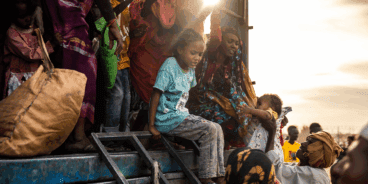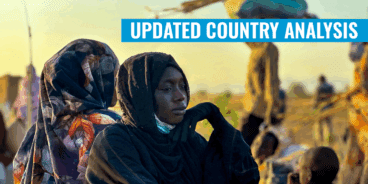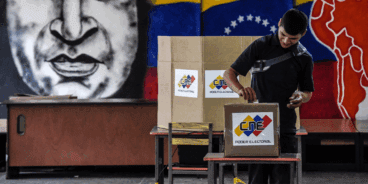
No Apology Necessary
The following article written by James Traub was originally published in Foreign Policy.
President Barack Obama has decided to send 100 Special Forces troops to the Heart of Darkness in order to defeat evil. That, at any rate, is how critics of the president’s decision to help the Ugandan army track down Joseph Kony and his gang of psychotic murderers known as the Lord’s Resistance Army (LRA) have described the undertaking. As Gerry Connolly, a Virginia Democrat, put it at a congressional hearing earlier this week, “What is the strategic interest of the United States in doing this? I mean, there are lots of unpleasant people in the world…. The United States obviously cannot try to dethrone every one of them.”
The Obama administration, of course, repudiates this narrative. A senior administration official blandly reassured me that the troop commitment constitutes the same “capacity-building” efforts the Pentagon has undertaken elsewhere in Africa, and even offers “a unique opportunity for our guys to train” — in a vast, trackless jungle in pursuit of maybe 250 lunatics. Assistant Secretary of Defense Alexander Vershbow told Congress that “it is in the interest of the United States to lend our support to partners in Africa so they can address threats to their citizens and help achieve the conditions necessary for regional security and broad-based development.”
Well, come on. This is not a training exercise, and the deaths of literally millions of civilians in central Africa over the last 15 years has had little discernible impact on American national security. In fact, the President has dispatched troops to the jungle and mountains of northeastern Democratic Republic of the Congo (DRC) and southwestern Central African Republic (CAR) to fight evil — and he should be congratulated for it. The moral case for action against the LRA is much stronger than, say, the case for joining the NATO bombardment of Muammar al-Qaddafi’s Libya. No less important, the Obama White House, State Department, and Pentagon have designed a complex and sophisticated approach that seems to have a real chance at bringing the LRA to book.
The LRA stands out even among the amoral hierarchy of the bandits and self-styled insurgents who roam Africa’s Great Lakes area. Despite its “Christian” rhetoric, the group has no program save for killing and raping, and abducting children as slaves and soldiers; atrocities, that is, are not the means to some programmatic end, no matter how ugly, but the end itself. The group’s top leaders, including their apparently charismatic supremo, Kony, were indicted for war crimes by the International Criminal Court in 2005, but have eluded capture. The United States has targeted them before. In late 2008, the George W. Bush White House provided crucial intelligence support for Operation Lightning Thunder, a Ugandan campaign to attack LRA forces by air and ground. The mission was a complete fiasco: Kony smelled out the attack and fled, and the Ugandans failed to get the support of their neighbors in Congo and South Sudan, while keeping U.N. forces completely in the dark. The LRA scattered throughout the region and proceeded to carry out a series of gruesome killings as retribution for the invasion.
Operation Lightning Thunder was a ham-fisted response to a very complicated problem. In an April 2010 report, the International Crisis Group suggested that any future U.S. attempt to rout the LRA should focus on “civilian protection” rather than just hot pursuit, and proposed that the United States send a team to the battlefield to coordinate intelligence from armies throughout the region and help the Ugandans put their soldiers where the bad guys are. That is more or less what the Obama administration has decided to do.
The claim by Obama officials that this new mission is merely an extension of an existing one is correct in one sense: In recent years, the U.S. Army’s African Command, known as Africom, has been training African armies, most of them woefully underequipped and unprofessional. The United States is working with the armies of the CAR, the DRC, South Sudan, and Uganda, all of which have been involved in the pursuit of the LRA. Congolese forces are notoriously corrupt and ill-equipped: Don Yamamoto, the State Department official who has worked on the issue, pointed out to me that American officials have had to make sure that the 391st Battalion, which they have trained, actually received its salary
Most of the American troops being sent to the region will work with headquarters staffs, collecting and analyzing intelligence from the field; Africom does similar work in other countries. What is new, however, is that several dozen Special Forces operatives will be forward-deployed with the Ugandan Army. (An intelligence official I spoke with pointed out that it is rare, but not unheard-of, for American forces engaged in counterterrorism operations to be embedded with local militaries in the field.) The biggest problem in the past, according to Yamamoto, is that the various militaries have not shared information with one another, and soldiers in the field haven’t known how to translate that intelligence into effective action. The American forces are intended to help fill those gaps. American intelligence resources, possibly including surveillance aircraft, will help pinpoint the LRA’s location.
There is also a civilian component to the effort. There are so few cell towers in the vast region traversed by the LRA that terrorized civilians have no way of alerting government officials to attacks. The U.S. Agency for International Development has spent $300,000 to build cell towers and establish a high-frequency radio system in DRC, though nothing comparable exists in the CAR. The United States has also been providing humanitarian aid to the region, though not very much of it — $18 million in 2011.
This interagency effort, coordinated by the National Security Council, looks very much like Obama administration global strategy writ small. It combines diplomacy, development, and military assistance — just as administration documents like the Quadrennial Diplomacy and Development Review recommend. It constitutes an intervention — the morning talk-show host Joe Scarborough ridiculed the effort as “invasion by press release” — but a modestly scaled and relatively inexpensive one. And the operation is meant to help bolster fragile states, which this administration has described as a national security goal. Perhaps the most atypical aspect is not the deployment of troops but the hearty approval of some conservative Republicans, like Sen. James Inhofe of Oklahoma, who championed a bill, the Lord’s Resistance Army Disarmament and Northern Uganda Recovery Act, which passed last year with bipartisan support. The administration has thus been able to claim that it is operationalizing Congress’s mandate.
Almost everything about the mission could go wrong, of course. American soldiers could be forced into battle; their Ugandan or Congolese partners could commit atrocities of their own; Kony and his lieutenants could elude capture, and go on another killing spree. Good plans can always fail. But the debate over this issue shows how difficult it has become to argue for even the most urgently needed and conscientiously devised form of humanitarian action. Though responding to Congress’s own explicitly moral directive, the Obama White House has had to dress up the effort in the language of national security and portray it as a business-as-usual proposition. Nevertheless, Obama has been accused of wading into another Vietnam; even the arch-interventionist Sen. John McCain has fretted that we may be “engaged in a commitment that we can’t get out of.”
Obama has said that he takes seriously the commitment to prevent mass atrocities embodied in the norm known as the responsibility to protect (R2P). Eric Posner has argued in Foreign Policy that R2P is too vague and inchoate to serve as a basis for action. But whatever the case, in general — and I don’t buy Posner’s argument — the principle plainly applies to Uganda and the LRA, since the norm commits countries to help states stop atrocities. Regional states haven’t been able to stop the LRA on their own; the United States, without much jeopardy to itself, might well be able to do so.
I asked Tom Malinowski, the Washington director of Human Rights Watch, if he understood why the Obama administration had decided to send troops to Uganda. Yes, he did, he said: “Because they thought it was the right thing to do.”
Related Content


Populations at Risk, November 2025
